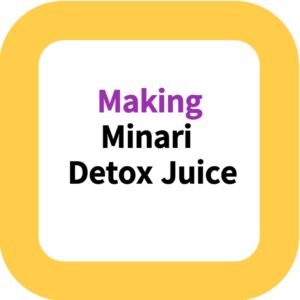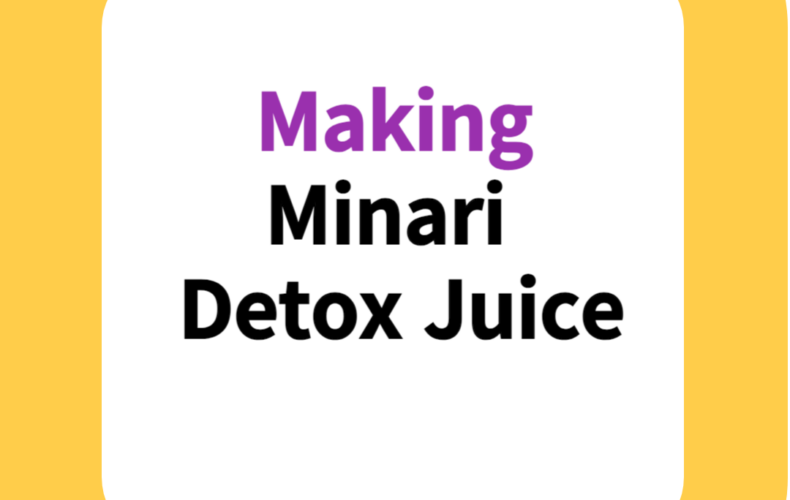Making Minari Detox Juice
Welcome! Today, we will learn how to make Minari detox juice. Feeling tired all day, dealing with a heavy body, and unexplained weight gain can be frustrating, especially in polluted environments.
A saying goes, “Nine out of ten diseases are caused by toxins.” These toxins and waste products can build up in our bodies, affecting our health. To help detoxify and rejuvenate, try making a simple and effective Minari Detox Juice using ingredients from your refrigerator.
This juice not only aids in eliminating toxins but also boosts your overall well-being. Join us as we explore the benefits ofMinari , radish, apple, and carrot, and learn how to prepare this revitalizing detox juice.
Making Minari Detox Juice

Many people often feel fatigued, heavy, and experience unexplained weight gain, especially in environments with heavy air pollution. In such situations, there’s a saying that comes to mind: “10 illnesses, 9 are due to phlegm.”
In modern terms, this ‘phlegm’ can be interpreted as toxins and waste products in the body. For optimal health, our bodies need proper circulation and communication.
When considering detoxification, it’s not always easy to decide what to consume. Today, I will introduce a detox recipe that can be easily made with ingredients found in your refrigerator.
The Benefits of Minari(Water Celery)
Minari is rich in moisture and offers numerous health benefits. It purifies the blood, detoxifies the body, reduces heat, and eliminates toxins. Additionally, it helps dissolve phlegm, stops coughing, and strengthens the digestive system.
The reason water celery is often added to puffer fish soup is that it helps neutralize the fish’s toxins. Moreover, water celery is effective against various heavy metal toxins, making it beneficial to consume with seafood for its detoxifying properties.
The Benefits of Radish
Radish is known as the best natural digestive aid and is highly effective in treating coughs. It has powerful detoxifying properties, aids digestion, and helps eliminate phlegm.
Radish juice is also known to relieve indigestion and soothe coughs. The skin of the radish contains antioxidants and vitamin C, making it beneficial to use the radish with its skin intact.
The Benefits of Apple
Apples are not only delicious but also highly nutritious. In traditional medicine, apples are known to generate body fluids and moisten the lungs, helping to expel foreign substances from the respiratory system and promote recovery.
The skin of the apple is rich in fiber and antioxidants, so it is best to use apples with their skin on.
The Benefits of Carrot
Carrots are packed with nutrients and are excellent for detoxification. They should be washed thoroughly and used with their skin. Carrots add nutritional value and enhance the detoxifying effects of the juice.
How to Make Minari Detox Juice
Ingredients
Minari: One handful
Radish: 1/2 piece
Apple: 1 piece
Carrot: 1 piece
Water: Adequate amount
Preparation Steps
Washing the Minari :
Minari may contain sand and leeches, so it must be washed thoroughly.
Soak Minari in a large bowl of water with a 10-won coin to help remove any leeches.
Rinse well and drain the excess water.

Preparing the Radish:
Wash the radish thoroughly and use it with its skin, as the skin contains many antioxidants and vitamin C.
Cut the radish into appropriate sizes for blending.
Preparing the Apple:
Wash the apple thoroughly and use it with its skin to retain its fiber and antioxidants.
Cut the apple into suitable pieces and remove the seeds.
Preparing the Carrot:
Wash the carrot thoroughly and use it with its skin.
Cut the carrot into appropriate sizes for blending.
Making the Juice
Blending the Ingredients:
Put the prepared Miari, radish, apple, and carrot into a blender.
Add a suitable amount of water to make the blending process easier.
Blending:
Operate the blender until all ingredients are well blended.
Add more water if necessary to achieve the desired consistency.
Straining the Juice:
Strain the blended juice through a sieve to obtain a smooth juice.
If preferred, you can drink the juice without straining it.
Consumption Method
Drink the freshly prepared juice one cup at a time.
Consuming one to two cups daily can help lighten your body and significantly aid in toxin elimination.
By regularly drinking this simple Minari detox juice, you can help your body eliminate toxins and maintain good health.
Conclusion
With this simple detox recipe, you can alleviate the discomfort caused by air pollution and fatigue. Utilizing easily accessible ingredients from your refrigerator, you can maintain your health and help your body rid itself of toxins. Drink this juice regularly to stay healthy and keep your body feeling light and energized.

I may receive a certain amount of commission through the Coupang Partners program
















